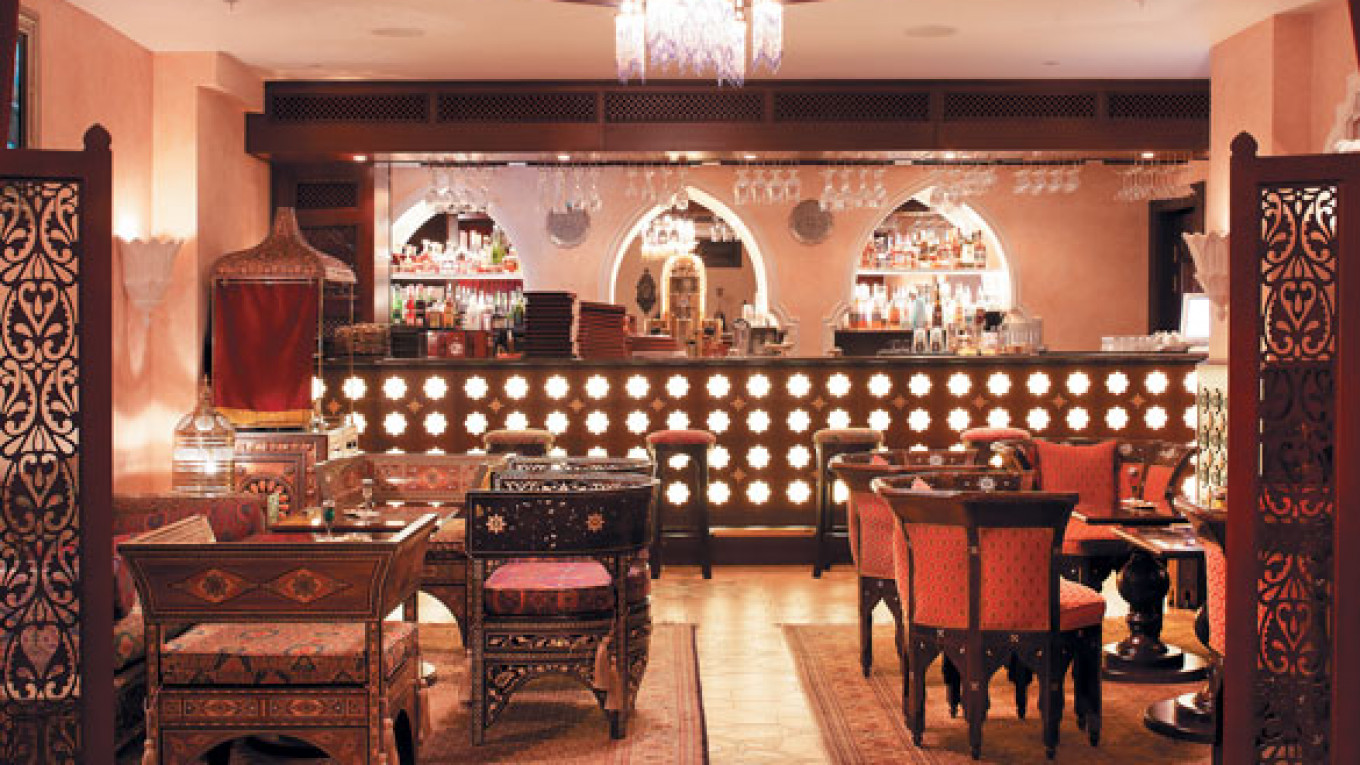Hotels are adopting a casual, less stuffy image and even relocating their restaurants to compete with bars and dining venues. Long overlooked, some are now becoming destinations in their own right.
International consultants identify a move away from fine dining, towards less complex food often served in expanded bar areas. Where hotels serve traditional cuisine, there is a trend to lease out restaurants to famous chefs.
Celebrated chef Arkady Novikov's Tatler Club in the iconic former Ukraine hotel, now the Radisson Royal Hotel Moscow, makes full use of architecture, with seating on two floors and a summer terrace. With eight restaurants and a riverboat, the hotel brands some of its restaurants as premium, including the Farsi restaurant, which claims to be the city's only Iranian restaurant.
"Rooftop bars are generally successful given the right location and offering. Ritz Carlton, Swissôtel and Park Hyatt are good examples that help to bring in outside guests from the city as well as appealing to hotel guests," said David Jenkins, head of Hotels and Hospitality for Russia at Jones Lang LaSalle. "Other hotels are now seeing the need to move the restaurant from the second floor down to street entrance for example."
The Hotel Metropol is opening a Summer Terrace and a Cafe Patisserie as well as a new Executive Lounge under the leadership of its new food and beverage director, Stephen Quinn, who joined last November.
"We have a new lounge bar menu and new restaurant menu which includes traditional Russian and Hotel Metropol favorites as well as some great new dishes," Quinn said. He is in the process of recruiting professionals from the Moscow food and beverage scene in preparation for further innovations.
The Metropol, founded in 1901, formally changed hands, when a company associated with hotels group Azimut, bought the Metropol from the Moscow city government last year. Azimut continues to operate the hotel.
While hotels in Moscow and St. Petersburg face tough competition from local restaurants, in the regions being the top hotel in town can be a great advantage, said Scott Antel, partner and head of Hospitality and Leisure for Russia at DLA Piper. "What we see in regions is that a hotel may keep its 3 1/2 star rating on its rooms, but make its facilities a little better. It will raise the quality of its conference and business facilities and its restaurants because that attracts customers from the surrounding district." In the regions, the hotel restaurants can be the best quality in the district, he said.
In the twin capitals, visitors have more choice and tend to want to go out and explore. That has led hotels to focus on their street frontage in order to take advantage of passing traffic.
Rezidor's Park Inn chain has tied up with German brewery Paulaner, to provide restaurants that serve beer fresh from microbreweries on site. "Usually, hotel restaurants are priced over the city restaurants, but we monitor prices and keep ours competitive," said Atakan Turhan, general manger of Park Inn by Radisson Pulkovskaya, St. Petersburg. "The Paulaner concept is different. Russians like German food, the restaurant is not formal, it's big, seating 600 people."
The restaurant design is wooden tables, with entertainment and a festive atmosphere. "The newer generation prefers a more casual dining experience," said Turhan. Only 20 percent are hotel guests.
The Bavarian concept provides an alternative to three other restaurants in the hotel, including buffet and Japanese. Guests at the Park Inn by Radisson Pulkovskaya are equally split between business and leisure travellers. Of these tourists, 90 percent arrive in tour groups comprising 70 percent international travelers and 30 percent Russian.
The company is rolling out its Paulaner restaurants to regional hotels, including the Park Inn by Radisson Yaroslavl and the Park Inn by Radisson Petrozavodsk.
In the 1990s, Moscow hotels had highly successful restaurants before local restaurants became more creative and competitive. Nowadays, hotel restaurants must work harder to react to changing markets.
Regulations and inspections are still a burden but have at least been modernized, Antel said. The early hotels like the Radisson Slavyanskaya had enormous kitchens because the regulations dating from Soviet times required them: separate lifts for clean laundry and dirty laundry, separate areas for washing and preparing different foods. Some of those regulations still exist but laws are nowadays applied with greater restraint, Antel said. "Some of those kitchens were so big you could run marathons around them."
If the kitchens are worth a visit in some hotels, in others a quick bite comes with a chance to see a lot more of their history. The Hilton Moscow Leningradskaya, for example, combines architectural history with Sunday brunch. Guests who arrive for brunch can also have a free tour around of the hotel, which was faithfully restored in 2008 to its original style from 1954.
A Message from The Moscow Times:
Dear readers,
We are facing unprecedented challenges. Russia's Prosecutor General's Office has designated The Moscow Times as an "undesirable" organization, criminalizing our work and putting our staff at risk of prosecution. This follows our earlier unjust labeling as a "foreign agent."
These actions are direct attempts to silence independent journalism in Russia. The authorities claim our work "discredits the decisions of the Russian leadership." We see things differently: we strive to provide accurate, unbiased reporting on Russia.
We, the journalists of The Moscow Times, refuse to be silenced. But to continue our work, we need your help.
Your support, no matter how small, makes a world of difference. If you can, please support us monthly starting from just $2. It's quick to set up, and every contribution makes a significant impact.
By supporting The Moscow Times, you're defending open, independent journalism in the face of repression. Thank you for standing with us.
Remind me later.






